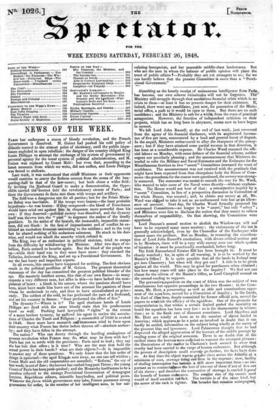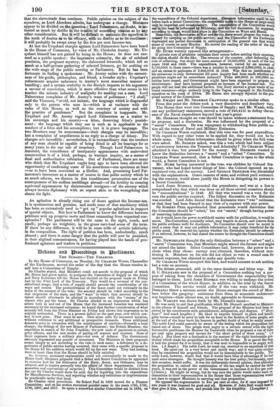Absorbing as the hourly receipt of momentous intelligence from Patios
has become, our own soberer vicissitudes will not be forgotten. The Ministry still struggle through that anomalous financial crisis which is no crisis to them—at least it has no present danger for their existence. If, indeed, there were any candidates, just now, for possession of the Minis- terial office, a path to it would be open to them. But there are no such candidates; and the Ministry is safe for a while, from the want of practical antagonists. However, the function of independent criticism on their projects, which has so long been in abeyance, seems now to have begun in earnest.
We left Lord John Russell, at the end of last week, just recovered from the agony of his financial disclosure, with its augmented income- tax of five per cent, encountered by a loud and general burst of disgust. In the sequel, Ministers endeavoured to allay the sharpness of the annoy- ance; but if they have attained some partial success in that direction, it has been at a considerable expense. Sir Charles Wood resumed the offi- cial labour on Monday, with some defence of the financial scheme, neither cogent nor peculiarly pleasing; and the announcement that Ministers in- tended to refer the Military and Naval Estimates and the Estimates for the Miscellaneous Services to two "secret" Committees increased the want of confidence. The announcement was not received with the gratitude that might have been expected from that obsequious body the House of Com- mons: the precedents for the course were questioned, the secrecy was strong- ly censured. The statement was meant to smooth the way for Mr. Ward, who wanted to take some of the Naval votes directly—without explana- tion. The House would not hear of that : a retrospective inquiry by a "secret" Committee, in lieu of a prospective discussion in Committee of the whole House, was scouted ; and, to obtain any money at all, Mr. Ward was oltireci to take it not as an undiscnssed vote but ;a an allow- ance oil account. Next day, Sir Charles Wood formally. proposed his contemned Committees—no longer to be "secret," but only "select"; and Ministers were fain to disclaim the notion that they meant to relieve themselves of responsibility. On that showing, the Committees were appointed. Lord Duncan's annual motion to abolish the Window-tax will not have to be repeated many more sessions : the viciousness of the tax is generally acknowledged, even by the Chancellor of the Exchequer who cannot spare the produce. But on Monday, in resuming the considera- tion of Lord John Russell's resolutions, with divers critical notices put in by Members, there will be a very wide survey over our whole system of taxation : it must be practically overhauled, before long.
The Irish Encumbered Estates Bill has been brought in. It must be closely watched ; for, in spite of all warning, it is to be worked by the
Master's Office It is quite possible that all the lands in Irelaqd may get into Chancery; but when will they get out? A title is to be given against all the world. This may be good for purchasers when obtained ; but how many years will take place in the inquiry? We find not one clause for the reform of the Master's Office, as Lord Campbell seemed on the second reading to suppose.
The preventiveoquadron on the coast of Africa was the subject of two simultaneous but opposite proceedings in the two Houses : in the Com- mons, Mr. Hutt, a persevering as well as able and conscientious oppo-
nent of the aqua Iron, moved for a Committee of inquiry ; in the Lords, the Earl of Aberdeen, deeply committed by former official acts, moved for
papers to establish the efficacy of the squadron. One of the grounds for congratulation is, that within a certain limited period the mortality on board the squadron has been very low : so is the thermometer in winter- time ;_so is the Bank rate of discount sometimes. Lord Aberdeen and Mr. Hutt are totally at issue as to the number of slaves landed in America; which appears to be a point so involved in doubt that it can hardly be settled, information on the subject being wholly at the mercy of
the grossest bias and ignorance. Lord Palmerston thought that he had
disproved the alleged aggravation of the horrors of the middle passage by reading some of the original accounts. There is no doubt. that at the earliest times the horror re surent to warrant the strongest phrases:
the illustrations of the ludiater in larkson's book seemed to show that cruelty had been carried to the verge of human endurance. But although
the powers of description could scarcely go further, the facts have done
so. At that time the object was-to get the slave across the Atlantic at a minimum of cost, stowage being one item in the expense : now, facility of eluding interception has become a Still more important itcm—so im- portant as to counterbalance the loss of two out of three if not of five out of six slaves ; and therefore the contraction of stowage is carried beyond the bounds of human endurance. The smaller size of the vessels used would of itself establish thifact. The torture is of' the same kind, but the screw of the rack is tighter. The broader fact remains unimpugnedl that the slave-trade does continue. Public opinion on the subject of the squadron, as Lord Aberdeen admits, has undergone a change. Ministers appear to be divided on the question : Lord Palmerston, no doubt, is ac- tuated as much by dislike to the trouble of unsettling treaties as by any Other consideration. But it will be difficult to maintain the squadron in the teeth of doubts as to its efficacy, with no doubts ars to its costliness : it will probably be swept away by the five per cent Income-tax. At last the Urquhart charges against Lord Palmerston have been heard in the House of Commons, by voice of Mr. Chisholm Anstey. Mr. Ur- quhart himself has not gained by being in the House; he does not suc- ceed as a public speaker: the impressive solemnity, the air of subdued precision, the pregnant mystery, the elaborated innuendo, which tell so much at a half-private gathering of selected listeners, go for nothing on the wide stage of the public meeting or Parliament. But he has been fortunate in finding a spokesman : Mr. Ansley unites with the earnest- ness of his guide, philosopher, and friend, a broader style ; Urquhart's refinements acquire substance in Anstey's more masculine manner of handling; and a certain credulity in the disciple imparts to his argument A savour of conviction, which is more effective than what seems in his teacher the minute industry of malignity for making out a case. Lord Palmerston complains of Mr. Anstey's want of politeness : "I shall," said the Viscount, "avoid, not imitate, the language which is disgraceful only to the person who uses it—which is at variance with the rules of this House, as well as the courtesy of society and with the practice of gentlemen." But the complaint is inapposite. Mr. Urquhart and Mr. Anstey regard Lord Palmerston as a traitor to hilt sovereign and his country—a felon, deserving felon's punish- ment : the language which they use is such as is applicable to the conduct of a felon and his accomplices; but it is grave language. The two Members may be monomaniacs—their charges may be incredible; but a complaint of nnpoliteness is no reply to a charge of felony. The Charges are incredible : nevertheless, it is extraordinary that the conduct Of any man should be capable of being fitted in all its bearings for so many years to the one tale of treachery. Though Lord Palmerston is innocent, the coincidence of inculpatory appearances with malevolent Construction is of a kind, perhaps, to warrant inquiry, as a means of final and authoritative refutation. Out of Parliament, there are many who think that Mr. Urquhart ought long ago to have been allowed the opportunity of confirming some of his assertions—one specimen at least —or to have been convicted as a libeller. And, presuming Lord Pal- merston's innocence as a matter of course in that polite society which he so much adorns, we discern in this troublesome persecution one of the consequences of his endless meddlings abroad—of his fertility in creating equivocal appearances by disinterested intrigues—of the secrecy which always invests diplomacy with an aspect akin to the wrongdoing that shuns the light.



























 Previous page
Previous page